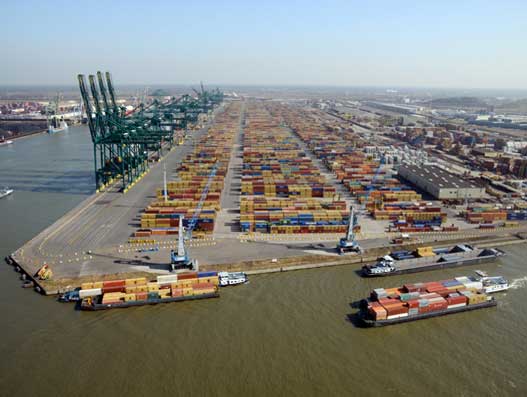Reductions in compensation payments given by the state-owned Port of Antwerp to two container terminal operators were granted on market terms and hence do not involve state aid within the meaning of EU rules, the European Commission said.
In 2004, the Antwerp Port Authority, a public authority in Belgium, which manages the Port of Antwerp, concluded concession agreements with two container terminal operators, PSA Antwerp NV and Antwerp Gateway NV.
The concession contracts for the provision of services related to the transshipment of containers in the Deurganckdok area of the port were concluded for a period of 42 years — until 2046.
As explained, the agreements between the port authority and the two concessionaires are similar to the concession contracts awarded by the authority to other container terminal operators and include a requirement that a minimum quantity of containers is handled in each terminal every year.
Between 2009 and 2012, PSA Antwerp NV and Antwerp Gateway NV failed to reach their yearly minimum tonnage requirements. As a result, under the concession agreements, they were expected to pay compensation to the Antwerp Port Authority.
However, instead of collecting the compensation due from the two companies, the Antwerp Port Authority retroactively revised downwards the minimum tonnage requirements for the two companies in March 2013. This reduced by around 80% the amount of compensation due by each of the two operators.
Following a complaint from a competitor, the commission opened an in-depth investigation to examine whether the compensation reductions applied by the Antwerp Port Authority were in line with EU State aid rules, and in particular whether a private operator would have accepted a similar reduction.
In the context of the economic crisis, a certain adjustment of the minimum tonnage requirements was justifiable since container volumes and traffic decreased in all major ports in Europe, including in the Port of Antwerp, according to the commission. For the same reason, the port authority also adjusted the minimum tonnage requirements of other terminal operators.
EC said that PSA Antwerp NV and Antwerp Gateway NV were in a very specific situation compared to other operators active in the Port of Antwerp. As the concessionaires of a new area of the port, they were still in a start-up phase when the economic crisis started. This put the two companies in an even more challenging situation in the context of the economic crisis and further justified the adjustment to their minimum tonnage requirements.
As the two concessionaires are key customers for the port, the port authority was concerned that forcing the two concessionaires to pay the full amount of compensation could have had negative effects on the economic situation of the companies and put their relationship with the port at risk.
The commission explained that the size of the reduction of the minimum tonnage requirements and the methodology applied by the Antwerp Port Authority to determine these adjustments for the two concessionaires were in line with what a private market operator would have used and applied.
Therefore, the commission found that the Antwerp Port Authority acted in the same way as a private market operator when reducing the minimum tonnage requirements for PSA Antwerp NV or Antwerp Gateway NV. As a result, the commission concluded that no state aid within the meaning of EU rules was granted to the two concessionaires.
Copyright Ships & Ports Ltd. Permission to use quotations from this article is granted subject to appropriate credit given to www.shipsandports.com.ng as the source.

